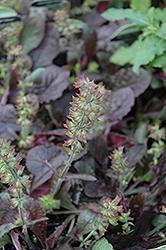Fri & Sat 8am - 8pm
Sun 8am - 7pm
Anytown, USA 12345
fax: 261.787.0463
e-mail: info@successgc.com


Plant Finder

Purple Volcano Sage
Salvia lyrata 'Purple Volcano'
Plant Height: 8 inches
Flower Height: 12 inches
Spacing: 12 inches
Sunlight:
![]()
Hardiness Zone: 4b
Other Names: Lyreleaf Sage
Description:
Stunning mounds of deep purple foliage from which erupt deep purple stems bursting with delicat white flowers; perfect for adding color contrast to borders and containers; dramatic when massed as a groundcover in sunny areas
Ornamental Features
Purple Volcano Sage's attractive glossy oval leaves emerge light green in spring, turning deep purple in color with curious burgundy undersides on a plant with a low base above which the flowers rise. As an added bonus, the foliage turns a gorgeous plum purple in the fall. It features delicate spikes of white flowers rising above the foliage from late spring to mid summer. The deep purple stems can be quite attractive.
Landscape Attributes
Purple Volcano Sage is an herbaceous perennial with tall flower stalks held atop a low mound of foliage. Its medium texture blends into the garden, but can always be balanced by a couple of finer or coarser plants for an effective composition.
This plant will require occasional maintenance and upkeep, and is best cleaned up in early spring before it resumes active growth for the season. It is a good choice for attracting bees, butterflies and hummingbirds to your yard, but is not particularly attractive to deer who tend to leave it alone in favor of tastier treats. Gardeners should be aware of the following characteristic(s) that may warrant special consideration;
- Self-Seeding
Purple Volcano Sage is recommended for the following landscape applications;
- Mass Planting
- Border Edging
- General Garden Use
- Groundcover
- Container Planting
Planting & Growing
Purple Volcano Sage will grow to be about 8 inches tall at maturity extending to 12 inches tall with the flowers, with a spread of 14 inches. When grown in masses or used as a bedding plant, individual plants should be spaced approximately 12 inches apart. Its foliage tends to remain low and dense right to the ground. It grows at a fast rate, and under ideal conditions can be expected to live for approximately 5 years. As an herbaceous perennial, this plant will usually die back to the crown each winter, and will regrow from the base each spring. Be careful not to disturb the crown in late winter when it may not be readily seen!
This plant should only be grown in full sunlight. It is an amazingly adaptable plant, tolerating both dry conditions and even some standing water. It is considered to be drought-tolerant, and thus makes an ideal choice for a low-water garden or xeriscape application. It is not particular as to soil pH, but grows best in clay soils. It is somewhat tolerant of urban pollution. Consider covering it with a thick layer of mulch in winter to protect it in exposed locations or colder microclimates. This is a selection of a native North American species. It can be propagated by division; however, as a cultivated variety, be aware that it may be subject to certain restrictions or prohibitions on propagation.
Purple Volcano Sage is a fine choice for the garden, but it is also a good selection for planting in outdoor pots and containers. It is often used as a 'filler' in the 'spiller-thriller-filler' container combination, providing a mass of flowers and foliage against which the larger thriller plants stand out. Note that when growing plants in outdoor containers and baskets, they may require more frequent waterings than they would in the yard or garden.
